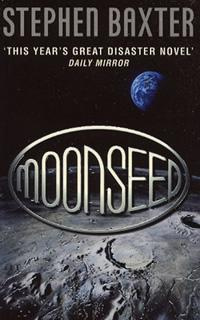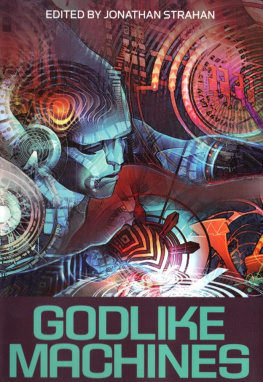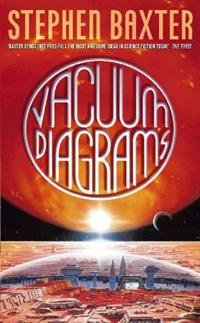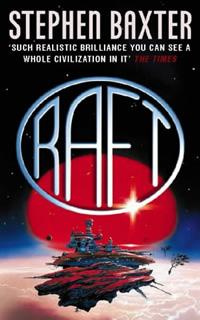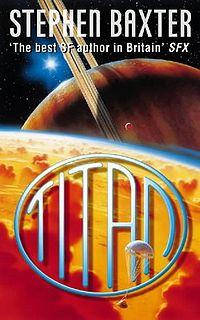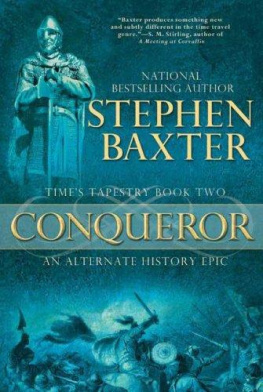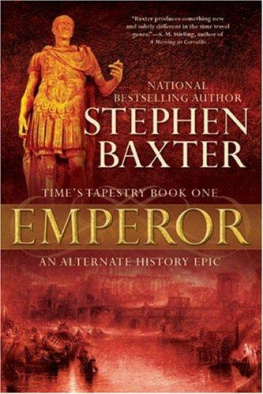Annotation
Michael Poole's wormholes constructed in the orbit of Jupiter had opened the galaxy to humankind. Then Poole tried looping a wormhole back on itself, tying a knot in space and ripping a hole in time.
It worked. Too well.
Poole was never seen again. Then from far in the future, from a time so distant that the stars themselves were dying embers, came an urgent SOS -- and a promise. The universe was doomed, but humankind was not. Poole had stumbled upon an immense artifact, light-years across, fabricated from the very string of the cosmos.
The universe had a door. And it was open...
Ring
By Stephen Baxter
For my nephew Thomas Baxter
PART I
Event: System
1
Even at the moment she was born she knew something was wrong.
A face loomed over her: wide, smooth, smiling. The cheeks were damp, the glistening eyes huge. "Lieserl. Oh, Lieserl..."
Lieserl. My name, then.
She explored the face before her, studying the lines around the eyes, the humorous upturn of the mouth, the strong nose. It was an intelligent, lived-in face. This is a good human being, she thought. Good stock...
"Good stock?"
This was impossible. She was impossible. She felt terrified of her own explosive consciousness. She shouldn't even be able to focus her eyes yet...
She tried to touch her mother's face. Her own hand was still moist with amniotic fluid -- but it was growing visibly, the bones extending and broadening, filling out the loose skin as if it were a glove.
She opened her mouth. It was dry, her gums already sore with budding teeth.
Strong arms reached beneath her; bony adult fingers dug into the aching flesh of her back. She could sense other adults surrounding her, the bed in which she'd been born, the outlines of a room.
Her mother held her high before a window. Lieserl's head lolled, the expanding muscles still too weak to support the burgeoning weight of her skull. Spittle laced across her chin.
An immense light flooded her eyes.
She cried out.
Her mother enfolded her in her arms. "The Sun, Lieserl. The Sun..."
The first few days were the worst.
Her parents -- impossibly tall, looming figures -- took her through brightly lit rooms, a garden always flooded with sunlight. She learned to sit up. The muscles in her back fanned out, pulsing as they grew. To distract her from the unending pain, clowns tumbled over the grass before her, chortling through huge red lips, before popping out of existence in clouds of pixels.
She grew explosively, feeding all the time, a million impressions crowding into her soft sensorium.
There seemed to be no limit to the number of rooms in this place, this House. Slowly she began to understand that some of the rooms were Virtual chambers -- blank screens against which any number of images could be projected. But even so, the House must comprise hundreds of rooms. And she -- with her parents wasn't alone here. There were other people. But at first they kept away, out of sight, apparent only by their actions: the meals they prepared, the toys they left her.
On the third day her parents took her on a trip by flitter. It was the first time she'd been away from the House, its grounds. As the flitter rose she stared through the bulbous windows, pressing her nose to heated glass.
The House was a jumble of white, cube-shaped buildings, linked by corridors and surrounded by garden -- grass, trees. Further out there were bridges and roads looping through the air above the ground, more houses like a child's bricks sprinkled across glowing hillsides.
The flitter soared higher.
The journey was an arc over a toylike landscape. A breast of blue ocean curved away from the land, all around her. This was the island of Skiros, Phillida -- her mother -- told her, and the sea was called the Aegean. The House was the largest construct on the island. She could see huge, brown-painted spheres dotting the heart of the island: carbon-sequestration domes, Phillida said, balls of dry ice four hundred yards tall.
The flitter snuggled at last against a grassy sward close to the shore of the ocean. Lieserl's mother lifted her out and placed her -- on her stretching, unsteady legs -- on the rough, sandy grass.
Hand in hand, the little family walked down a short slope to the beach.
The Sun burned from an unbearably blue sky. Her vision seemed telescopic. She looked at distant groups of children and adults playing -- far away, halfway to the horizon -- and it was as if she was among them herself. Her feet, still uncertain, pressed into gritty, moist sand.
She found mussels clinging to a ruined pier. She prized them away with a toy spade, and gazed, fascinated, at their slime-dripping feet. She could taste the brine salt on the air; it seemed to permeate her very skin.
She sat on the sand with her parents, feeling her light costume stretch over her still-spreading limbs. They played a simple game, of counters moving over a floating Virtual board, with pictures of ladders and hissing snakes. There was laughter, mock complaints by her father, elaborate pantomimes of cheating.
Her senses were electric. It was a wonderful day, full of light and joy, extraordinarily vivid sensations. Her parents loved her -- she could see that in the way they moved with each other, came to her, played with her.
They must know she was different; but they didn't seem to care.
She didn't want to be different -- to be wrong. She closed her mind against her fears, and concentrated on the snakes, the ladders, the sparkling counters.
Every morning she woke up in a bed that felt too small.
Lieserl liked the garden. She liked to watch the flowers straining their tiny, pretty faces toward the Sun, as the great light climbed patiently across the sky. The sunlight made the flowers grow, her father told her. Maybe she was like a flower, she thought, growing too quickly in all this sunlight.
The House was full of toys: colorful blocks, and puzzles, and dolls. She picked them up and turned them over in her stretching, growing hands. She rapidly became bored with each toy, but one little gadget held her attention. It was a tiny village immersed in a globe of water. There were tiny people in there, frozen in mid-step as they walked, or ran, through their world. When her awkward hands shook the globe, plastic snowflakes would swirl through the air, settling over the encased streets and rooftops. She stared at the entombed villagers, wishing she could become one of them: become frozen in time as they were, free of this pressure of growing.
On the fifth day she was taken to a wide, irregularly shaped, sunlight drenched classroom. This room was full of children -- other children! The children sat on the floor and played with paints and dolls, or talked earnestly to brilliantly colored Virtual figures -- smiling birds, tiny clowns.
The children turned to watch as she came in with her mother, their faces round and bright, like dapples of sunlight through leaves. She'd never been so close to other children before. Were these children different too?
One small girl scowled at her, and Lieserl quailed against her mother's legs. But Phillida's familiar warm hands pressed into her back. "Go ahead. It's all right."
As she stared at the unknown girl's scowling face, Lieserl's questions, her too-adult, too-sophisticated doubts, seemed to evaporate. Suddenly, all that mattered to her -- all that mattered in the world -- was that she should be accepted by these children: that they wouldn't know she was


